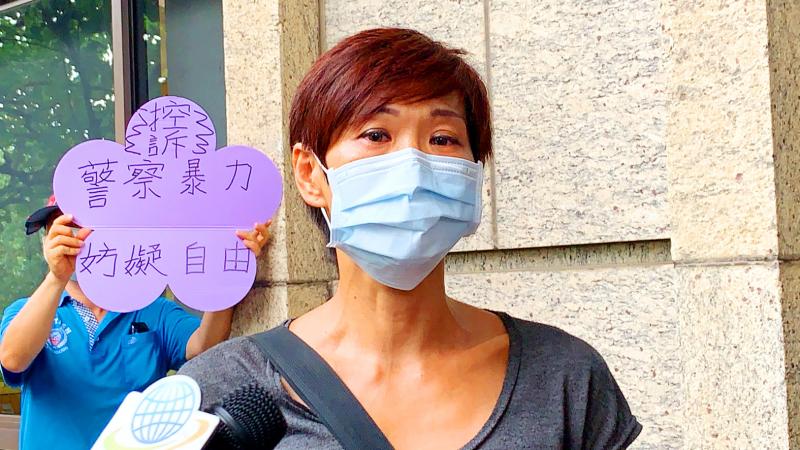Taoyuan prosecutors have indicted a Jhongli District (中壢) police officer for allegedly throwing a female music teacher to the ground and handcuffing her after she refused to submit to questioning.
The Taoyuan District Prosecutors’ Office had initially declined to press charges, but the Taiwan High Prosecutors’ Office ordered local authorities in December last year to conduct a second review after the music teacher, Chan Hui-ling (詹慧玲), filed an appeal.
On April 22 last year, a police officer, surnamed Yeh (葉), approached Chan as she was walking near Jhongli Railway Station and attempted to question her, asking her name, if she lived nearby and whether she was carrying identification.

Photo: CNA
When Chan asked why, the officer said he was worried “someone reported you missing” — apparently assuming she was an unaccounted-for migrant worker, a video of the encounter released by police shows.
A dispute broke out after Chan refused to answer Yeh, with Chan appearing to use the words “really stupid,” the video shows.
When the officer asked if she called him stupid, Chan replied: “What you did violated ...”
The officer interjected, saying: “Okay, well you’ve just called me stupid,” before the video clip stops a few seconds later.
However, videos of the subsequent moments taken by bystanders show Yeh throwing Chan to the ground and handcuffing her as she screams in panic.
He then places her under arrest for “obstructing a public official,” the video shows.
In Facebook posts after the incident, Chan argued that Yeh did not have grounds to question her, and accused him of abusing his power by slamming her to the ground, handcuffing her and holding her at a police station for questioning.
Prosecutors said in a news release yesterday that after conducting a second review of the evidence in the case, they had charged Yeh with offenses against personal freedom by a public official.
The Taoyuan Police Department’s Jhongli Precinct vowed to respect the judicial process, and to step up training to ensure officers carry out their duties legally and with a sense of proportionality.

A preclearance service to facilitate entry for people traveling to select airports in Japan would be available from Thursday next week to Feb. 25 at Taiwan Taoyuan International Airport, Taoyuan International Airport Corp (TIAC) said on Tuesday. The service was first made available to Taiwanese travelers throughout the winter vacation of 2024 and during the Lunar New Year holiday. In addition to flights to the Japanese cities of Hakodate, Asahikawa, Akita, Sendai, Niigata, Okayama, Takamatsu, Kumamoto and Kagoshima, the service would be available to travelers to Kobe and Oita. The service can be accessed by passengers of 15 flight routes operated by

GIVE AND TAKE: Blood demand continues to rise each year, while fewer young donors are available due to the nation’s falling birthrate, a doctor said Blood donors can redeem points earned from donations to obtain limited edition Formosan black bear travel mugs, the Kaohsiung Blood Center said yesterday, as it announced a goal of stocking 20,000 units of blood prior to the Lunar New Year. The last month of the lunar year is National Blood Donation Month, when local centers seek to stockpile blood for use during the Lunar New Year holiday. The blood demand in southern Taiwan — including Tainan and Kaohsiung, as well as Chiayi, Pingtung, Penghu and Taitung counties — is about 2,000 units per day, the center said. The donation campaign aims to boost

ENHANCING EFFICIENCY: The apron can accommodate 16 airplanes overnight at Taoyuan airport while work on the third runway continues, the transport minister said A new temporary overnight parking apron at Taiwan Taoyuan International Airport is to start operating on Friday next week to boost operational efficiency while the third runway is being constructed, the Ministry of Transportation and Communications said yesterday. The apron — one of the crucial projects in the construction of the third runway — can accommodate 16 aircraft overnight at the nation’s largest international airport, Minister of Transportation and Communications Chen Shih-kai (陳世凱) told reporters while inspecting the new facility yesterday morning. Aside from providing the airport operator with greater flexibility in aircraft parking during the third runway construction,

American climber Alex Honnold is to attempt a free climb of Taipei 101 today at 9am, with traffic closures around the skyscraper. To accommodate the climb attempt and filming, the Taipei Department of Transportation said traffic controls would be enforced around the Taipei 101 area. If weather conditions delay the climb, the restrictions would be pushed back to tomorrow. Traffic controls would be in place today from 7am to 11am around the Taipei 101 area, the department said. Songzhi Road would be fully closed in both directions between Songlian Road and Xinyi Road Sec 5, it said, adding that bidirectional traffic controls would